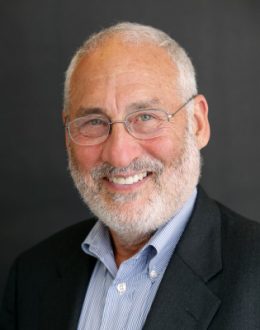
Joseph Stiglitz keynote speaker
- Globalisation
- Impact of Low-Rate Savings
- Long-Term Growth Prospects
- Market Failures
- Sector
- The Economics of Information
- The Economics of the Public
- The Role of the Government in the Economy
Joseph E. Stiglitz was born in Gary, Indiana in 1943. A graduate of Amherst College, he received his PHD from MIT in 1967, became a full professor at Yale in 1970, and in 1979 was awarded the John Bates Clark Award, given biennially by the American Economic Association to the economist under 40 who has made the most significant contribution to the field. He has taught at Princeton, Stanford, MIT and was the Drummond Professor and a fellow of All Souls College, Oxford. He served in the Clinton administration as the chair of the President's Council of Economic Advisors (1995 – 1997). At the World Bank, he served as senior vice-president and chief economist (1997 – 2000).
In 2001, he was awarded the Nobel Prize in economics for his analyses of markets with asymmetric information, and he was a lead author of the 1995 Report of the Intergovernmental Panel on Climate Change, which shared the 2007 Nobel Peace Prize.
Stiglitz was a member of the Council of Economic Advisers from 1993-95, during the Clinton administration, and served as CEA chairman from 1995-97. He then became Chief Economist and Senior Vice-President of the World Bank from 1997-2000. In 2008, he was appointed by French President Nicolas Sarkozy to chair a Commission on the Measurement of Economic Performance and Economic Progress.
Stiglitz was the president of the International Economic Association from 2011 to 2014.
Stiglitz is now a professor at Columbia University, with appointments at the Business School, the Department of Economics and the School of International and Public Affairs, and is editor of The Economists' Voice journal with J. Bradford DeLong and Aaron Edlin. He also gives classes for a double-degree program between Sciences Po Paris and École Polytechnique in 'Economics and Public Policy'. He has chaired The Brooks World Poverty Institute at the University of Manchester since 2005. Stiglitz is a New-Keynesian economist.
Stiglitz helped create a new branch of economics, “The Economics of Information,” exploring the consequences of information asymmetries and pioneering such pivotal concepts as adverse selection and moral hazard, which have now become standard tools not only of theorists, but of policy analysts. He has made major contributions to macro-economics and monetary theory, to development economics and trade theory, to public and corporate finance, to the theories of industrial organization and rural organization, and to the theories of welfare economics and of income and wealth distribution. In the 1980s, he helped revive interest in the economics of R&D.
His work has helped explain the circumstances in which markets do not work well, and how selective government intervention can improve their performance.
Recognized around the world as a leading economic educator, he has written textbooks that have been translated into more than a dozen languages. He founded one of the leading economics journals, The Journal of Economic Perspectives. His book Globalization and Its Discontents (2001) has been translated into 35 languages, besides at least two pirated editions, and in the non-pir
ated editions has sold more than one million copies worldwide. Other books include The Roaring Nineties, Towards a New Paradigm in Monetary Economics with Bruce Greenwald, Fair Trade for All, with Andrew Charlton, and Making Globalization Work, (2006), The Three Trillion Dollar War: The True Cost of the Iraq Conflict, with Linda Bilmes, (2008). The latest book became the best seller, The Great Divide: Unequal Societies and What We Can Do About Them (2015).
Stiglitz is the 4th most influential economist in the world today, and in 2011 he was named by Time magazine as one of the 100 most influential people in the world.




